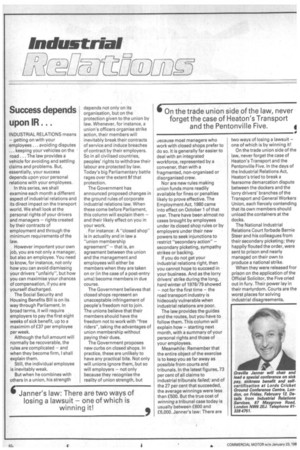Industrial
Page 58

If you've noticed an error in this article please click here to report it so we can fix it.
YLThI
Success depends upon IR .
INDUSTRIAL RELATIONS means — getting on with your employees ... avoiding disputes ... keeping your vehicles on the road. .. The law provides a vehicle for avoiding and settling claims and problems. But, essentially, your success depends upon your personal relations with your employees.
In this series, we shall examine each month a different aspect of industrial relations and its direct impact on the transport world. We shall look at the personal rights of your drivers and managers — rights created by their contracts of employment and through the minimum requirements of the law.
However important your own job, you are not only a manager, but also an employee. You need to know, for instance, not only how you can avoid dismissing your drivers "unfairly", but how you can maximise your chances of compensation, if you are yourself discharged.
The Social Security and Housing Benefits Bill is on its way through Parliament. In broad terms, it will require employers to pay the first eight weeks of sick benefit, up to a maximim of £37 per employee per week.
Although the full amount will normally be recoverable, the rules are complicated — and when they become firm, I shall explain them.
Still, the individual employee is inevitably weak.
But when he combines with others in a union, his strength depends not only on its organisation, but on the protection given to the union by law. Whenever, for instance, a union's officers organise strike action, their members will inevitably break their contracts of service and induce breaches of contract by their employers. So in all civilised countries, peoples' rights to withdraw their labour are protected by law. Today's big Parliamentary battle rages over the extent iNf that protection.
The Government has announced proposed changes in the ground rules of corporate industrial relations law. When these come before Parliament, this column will explain them — and their likely effect on you in your work.
For instance: A "closed shop" is in actuality and in law a "union membership agreement" — that is, an agreement between the union and the management and employees will either be members when they are taken on or (in the case of a post-entry uma) become members in due course.
The Government believes that closed shops represent an unacceptable infringement of people's freedom not to join. The unions believe that their members should have the freedom not to work with "free riders", taking the advantages of union membership without paying their dues.
The Government proposes new curbs on closed shops. In practice, these are unlikely to have any practical bite. Not only will unions ignore them, but so will employers — not only because they recognise the reality of union strength, but oecause most managers who work with closed shops prefer to do so. It is generally far easier to deal with an integrated workforce, represented by a convener, than with a fragmented, non-organised or disorganised crew.
Nor are new rules making union funds more readily available for fines or penalties likely to prove effective. The Employment Act, 1980 came into effect on October 1 of that year. There have been almost no cases brought by employees under its closed shop rules or by employers under their new powers to seek injunctions to restrict "secondary action" — secondary picketing, sympathy strikes or backing.
If you do not get your industrial relations right, then you cannot hope to succeed in your business. And as the lorry drivers' strike during the long, hard winter of 1978/79 showed — not for the first time—the road transport industry is hideously vulnerable when industrial relations are poor.
The law provides the guides and the routes, but you have to follow them. This column will explain how — starting next month, with a summary of your personal rights and those of your employees.
Meanwhile: Remember that the entire object of the exercise is to keep you a5 far away as possible from courts and tribunals. In the latest figures, 73 per cent of all claims to industrial tribunals failed; and of the 27 per cent that succeeded, the average winnings were less than £500. But the true cost of winning a tribunal case today is usually between £600 and £6,000. Janner's law: There are two ways of losing a lawsuit — one of which is by winning it!
On the trade union side of the law, never forget the case of Heaton's Transport and the Pentonville Five. In the days of the Industrial Relations Act, Heaton's tried to break a fearsome demarcation dispute between the dockers and the lorry drivers' branches of the Transport and General Workers Union, each fiercely contending that its own members should unload the containers at the docks.
The National Industrial Relations Court forbade Bernie Steer and his colleagues from their secondary picketing; they happily flouted the order, were sent to prison and nearly managed on their own to produce a national strike.
When they were released fror prison on the application of the Official Solicitor, the Five cried out in fury. Their power lay in their martyrdom. Courts are the worst places for solving industrial disagreements.




































































